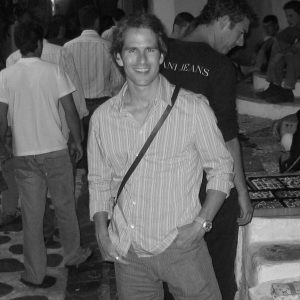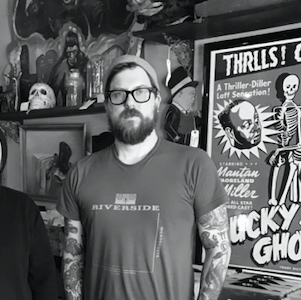
How New York’s Small Businesses Are Handling the Coronavirus Crisis
The Vivid Minds spoke with six business owners from different fields – skin-care products, a yoga studio, restaurants, a record label and a wine store – about how they are hanging on and adapting during these uncertain times.
At Sweetwater labs, we produce natural skin-care products. Three years ago, my wife, Nadia, made some for herself. Then we gave them to our friends and they asked for more, so we started selling a little. We developed the first products in our apartment in New York, and then we rented out a space and created a lab—that’s where the name comes from.
Before the crisis, most of our sales had come from our physical locations—one in the World Trade Center (the Oculus) and one in the Columbus Circle Underground Market. We noticed that they started slowing down with all the terrible news coming out about a month ago, and now they’re completely closed. Obviously, the crisis affected restaurants, bars, stores, and so many businesses. Now we don’t have any revenue from those spaces, but, fortunately, we also have a website for online sales.
In the past two weeks, we’ve seen people buying from our website, especially because we started developing new products, such as a natural sanitizer. So it’s not such a big difference for us as it might be for other businesses. As much as we’re going through our own challenges, there are people who have it so much worse than us, like restaurant owners, bartenders, and waiters, so we are really grateful for what we do have. We are always trying to look on the bright side.
Now we are putting more effort into email campaigns and online marketing. We’ve been working on it for a while, but never had time to finish it until now. These days we can email people about our new products. We were sold out a few days after we started promoting our sanitizer, and we have more orders than we normally do. We are trying to use the crisis as an opportunity to develop our business in another, more digital direction.
We will always have our physical locations, because people want to smell and try out our products. It’s not the same when you see a Facebook or Instagram ad and you don’t really know whether you’ll like it or not. But in order to grow business we need to reach out to hundreds or thousands or millions of people instead of meeting fifty or a hundred people a day. If we email ten thousand people in two weeks and there’s only one thousand people who open the email, and a hundred people buy our products, it’s not a lot—but it’s a hundred more new customers. By the end of two months, we will have five hundred new customers.
Sanitizers help us to sustain the revenue for sure, but they’re also a way for new customers to learn about the company. For example, this week we had a lot of orders for sanitizer. One woman said that she was just Googling natural sanitizer, because regular ones damage skin, and our website popped up, so she ordered a few other things, too.
The main challenge for us is definitely to continue to get ourselves out there and connect with people. Normally we would do events and connect with people in-person—that’s how we get their attention and make them read the email and hold onto them as a customer.
In terms of our rents, we are negotiating on credit for the future for the days that we are closed. We’re also continuing to pay the charities we work with a part of our revenue. That’s part of our core mission, to support good causes, so even in these hard times we keep doing it. It’s not thousands of dollars, but it’s something.
As for the team, we have six employees and we treat them like family. Fortunately, we didn’t have to lay off the team—we just found other things they can help us with from home.
The Vivid Minds supports local businesses. If you would like to try out Sweetwater lab’s natural products, use promo code VividMinds at the checkout for 10% off.
We are a pop-up yoga studio—we normally rent out spaces or do yoga outdoors. Because of that, we don’t have the problem with paying rent that many studies have now. We’ve switched everything online pretty quickly, too, although we are still playing out some aspects, like how to have wine and network digitally. Our concept is pretty unique‚—we host yoga and cocktails, or do disco yoga in silence. We are bringing people to their yoga mat and not necessarily to a yoga studio, where they might feel intimidated.
Our main revenue comes from curated wellness areas at music and other festivals. We’ve partnered with New York Road Runners, the Gov Ball Festival, Firefly Festival, and other companies. The situation now is really sad, because we had many brand partnerships lined up for the spring and early summer. Volvo was supposed to bring us for an event that would have covered our expenses for a month, which would have let us continue doing all the things we do for the community, like our suggested-donation yoga classes.
I got my yoga-teacher training a few years ago, but my background is in event marketing—I’ve been doing it for about ten years. It was really hard to get a job in New York as a yoga instructor because it’s so competitive—they ask you to work for free for a long time. I thought there should be a better way to do it. I created this activity of taking people out of a bar to a yoga class, followed by a wine happy hour and a networking session.
Now we do twelve classes a week via Instagram Live—you can book it via Mindbody, as before, or via Eventbrite, and pay a $5 suggested donation.
To keep Sputnik growing, we are expanding our affiliate program. Because we do yoga and cocktails, we obviously can’t do it in the same way right now, but we have partnered up with Winc, a wine-delivery company. Once we get people signed on, we receive money from them, plus people can enjoy wine at a discounted price. So we are finding unique ways and revenue streams to keep us afloat. We’ve also partnered with Time Out New York, so we’re doing a thirty-minute class with them. And we’re taking Instagram Stories to our partners platforms as well. For example, we’re doing daily meditation sessions on BrainGear’s platform. We’re trying to do a variety of things to continue growing the brand, to get it out there and support the community.
We’re thinking of doing a happy hour via Zoom after the I.G. Live. The challenge now is to figure out how we bring this live aspect into a digital platform. Maybe we will have a specific topic and people can jump in to discuss it.
I recently converted my back room into a yoga space where I can shoot videos, and all of our equipment is stored downstairs, in the basement. The turnout for online classes is definitely smaller, but that’s because there is so much going on online. We also need to figure out how to manage our programs, and then we’ll start to market it. We now suggest $5 donations—the first $20 goes to the teacher, and then the rest goes toward our marketing and studio support.
As for the foreseeing future, I think companies will realize that their employees can do things from home, so things will be different. But we will always be going to studios because, as human beings, we need to be pulled towards each other. The crisis is going to create other massive revenue and opportunity for online, at-home fitness and businesses in a way that we haven’t seen before.
We are still open right now, and we’re still selling our pickled goods in stores and online. We decided to stay with our customers until Passover and celebrate this important holiday with them. But we will close on April 7th, with the hope of re-opening in May.
The biggest challenge for us so far is the health aspect. We have to make sure we stay clean, sanitize, and keep practicing social distancing with staff and customers.
Besides our two stores in the Lower East Side, we always have our online store and all the infrastructure to sell and deliver online. Online sales went up slightly after the coronavirus outbreak, but because it landed during our busiest season, sales went down, even online, due to the fact some people may not be celebrating or at least not celebrating in the usual large groups.
Financially, we are hurting. Restaurants are closed, so we lost practically all the wholesale revenue. Usually, Passover is our busiest season, but this year we lost it. I can’t put an exact number to it, but I would say we lost at least $100,000 in revenue.
We have a small team, and I’ve had to let some of my people go. Everyone here is in shock and very disappointed.
Wine and spirit shops have been deemed “essential businesses,” so our three stores remain open for pickup or delivery options. The biggest stress has been in regard to the health and safety of my colleagues and their families.
On Thursday, March 12th, we suspended our in-store Tasting Table. At the time, with the current number of confirmed cases and information available, that seemed like a prudent measure to take. Just three days later, on Sunday, March 15th, we implemented a policy that required our customers to order for delivery and storefront/curbside pickup only. Customers were no longer allowed in the store, and all orders had to be placed online or over the phone. Inside the store, each of my colleagues worked with their own workstation, telephone, tape gun, and handtruck, at the maximum possible distance from one another.
Moore Brothers has always guaranteed paid sick leave, and we are encouraging everyone to stay home for absolutely any reason. Everyone provided great ideas and feedback during the development of our new in-store safety methods, and also regarding the new protocols for doing business with customers. And they adapted to those changes quickly, on the fly. Things continue to evolve on a near-daily basis—we’ve recently decided to close for order pickups on Sundays, so everyone can get some extra rest and extra distance from one another.
We’ve always had an online store, but we’ve certainly seen an increase in orders and users over the past few weeks. We’re enormously thankful that we haven’t seen a drop off in sales or customers yet. It may sound trite, but we are fortunate to serve a really wonderful and loyal customer base. But, much like grocery stores and pharmacies, we happen to be in one of the few businesses that the public really finds to be “essential” during this awful crisis.
People might think that the most difficult challenge right now would be finances, but it’s more complicated. As a record store that operates as a café, we fell under New York City’s guidelines for an “essential business.” As flattering as that may sound, it has raised moral and ethical issues for us. We can’t make employees come in and we want what’s best for them and their safety, so we worked with the two who volunteered to keep our doors open.
The other challenge is that we don’t want to be seen as a risk or a danger. So far, we’ve heard nothing but praise from our tight-knit community, a portion of whom still swing by daily and grab their coffee.
My business partner Mike Polnasek and I have always wanted to push for a greater online presence, and now we’re seizing the opportunity to do that. If it weren’t for our online sales right now, we’d be in much bigger trouble. We’ve stripped down the shop and streamlined our handling of the products, and we’ve added a lot of effort to our already stringent cleaning policies.
With the new online store, we receive more orders, so we’re packing up more coffee and T-shirts lately for sure. We both really miss all the companies we used to get in the shop, which had always been one of the greatest attributes of owning the brick-and-mortar store.
Our employees are like family to us, and even the ones who have chosen to take this time off have really stepped up to bat for us. We’ve seen their families ordering from us online — it’s hard to say how much we appreciate that.
On a good day, now we’re seeing 25% of a normal, pre-coronavirus day of business in the shop. We’ve been taking losses regularly just to keep things moving. If anyone wants to help support Black Gold, our store is always open online and we ship daily.
I opened Que Chevere last November, the day before Thanksgiving, and after four months I had to temporarily close it because of the coronavirus. We thought about staying open there and making deliveries but after I calculated all the expenses to organize delivery and I decided not to do it.
I was born and raised on Delancey Street, I’m an OG (original gangster) from the Lower East Side and I wanted to bring back ethnic Puerto Rican food. In 2018, my daughter Lily came to me with the idea of launching an Hispanic and Puerto Rican food catering service to serve the community. She is a good chef, people knocked at her door and asked her to cook dinner for them. She wanted to monetize it and I thought that it’s a good idea to support my family in the future.
I’ve never run a restaurant before, I have a successful career in the music industry, but I always wanted to have a family business.
When I submitted my vendor form to The Market Line, a new cool culinary hub at the LES, I wasn’t sure if they would choose me, but they did! They loved the idea from the beginning and it was very inspiring. The Market Line is a great spot and opportunity for any small vendor and I’m very thankful to them.
The biggest challenge right now is not money. The Market Line is a big organization and our rent was abated, I don’t have to pay it at the moment. Surviving till reopening is my biggest challenge.
Your biggest assets in a restaurant business are your people. It’s all about customer service, and it can be as good as the people that feel good. My staff at the moment is on the temporary hiatus, I gave them all the tools to file for unemployment and luckily my staff got on board with unemployment back in March. My team is small, I have 5 to 7 people, and the only person I take care right now is my chef because he is on family medical leave with a newborn baby.
Personally, I’m still employed with my main job, my wife is employed so we are in an OK place. I have not taken a loan to open my startup. My strategy was to use my savings. It helped me fund it till now.
I’m very positive that when we come back there will be a line of our customers who missed our food.
You can follow me on Instagram to get a notification when we are back. I promise you it’s going to be a lot of hooplas! We are going to come back bigger than ever, we will have our second big opening.
Overall, I expect the financial loss will be over $100, 000. I’m not suffering, and we will be back, I promise.





